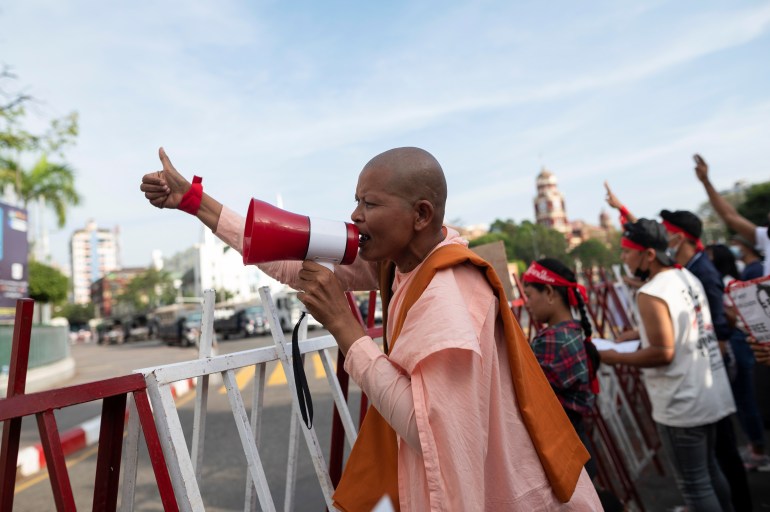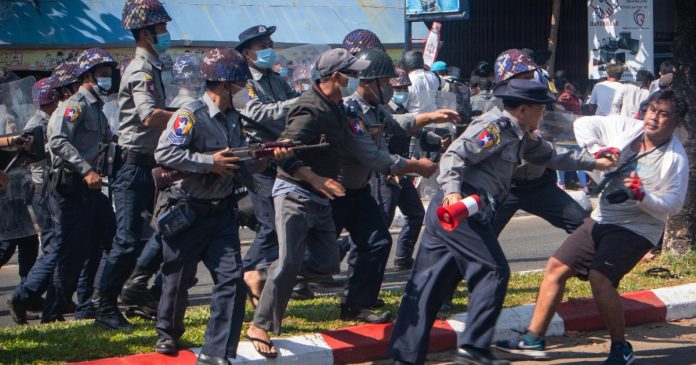[ad_1]
The UN’s top rights body has demanded that Myanmar’s military restore civilian rule and release the country’s leader, Aung San Suu Kyi, echoing the calls of hundreds of thousands thronging cities nationwide.
During a rare special session on Friday requested by the United Kingdom and the European Union, the Human Rights Council adopted a resolution calling for all persons “arbitrarily detained” to be released and the “restoration of the elected government”.
“The world is watching,” the UN’s deputy rights chief Nada al-Nashif at the start of the session.
More nationwide protests are expected on Saturday demanding the country’s generals to relinquish power and release the democratically elected leaders.
Besides Aung San Suu Kyi and President Win Myint, more than 350 others have been detained since the February 1 putsch, including activists, journalists, students and monks, al-Nashif said.
In addition, “draconian orders have been issued this week to prevent peaceful assembly and free expression,” she said, decrying the “indiscriminate use of lethal or less-than-lethal weapons”.
But traditional allies of Myanmar’s military, including Russia and China, slammed the emergency session as interference in “Myanmar’s internal affairs”.
‘Fight until victory’
With teachers, bureaucrats and air traffic controllers among the government employees walking off the job this week to demand an end to military rule, the new military leader Min Aung Hlaing told striking workers to return to their offices.
But hundreds of thousands still came out Friday in nationwide rallies – the seventh straight day of protests – demanding the country’s generals relinquish power.
Many of the protesters stayed well into the night in Yangon, defying the curfew imposed by the military.
In Pazundaung and Sanchaung districts of the country’s largest city, people spilled out into the streets searching for the police, after reports that a local medical official has been arrested.
There have also been reports on social media of authorities snatching protesters from the streets.
Thousands of residents across multiple townships in Yangon have spilled out onto the streets from 10pm – in defiance of the 8pm curfew – after rumours spread that police were arresting local dissidents. #WhatsHappeningInMyanmar
Read more on our liveblog: https://t.co/3I5sZ5Pxb4 pic.twitter.com/0JpjTmZWdb— Frontier Myanmar (@FrontierMM) February 12, 2021
Demonstrations have so far largely been peaceful, though this week saw police deploy tear gas, water cannon and rubber bullets against protesters.
Live rounds were fired at a rally in Naypyidaw on Tuesday, critically wounding two people – including a woman who was shot in the head.
On Friday, in the port city of Mawlamyine, police fired rubber bullets on students while dispersing a sit-down protest.
Some of the demonstrators were briefly hospitalised, while nine were taken into custody. They were later freed after a crowd mobbed a police station and demanded their release.
Prison amnesty
Earlier in the day, state media announced the release of more than 23,000 inmates as part of a prison amnesty – a mass clearing of the country’s jails as authorities step up a crackdown on striking workers.
In the Irrawaddy Delta, home to much of Myanmar’s rice crop, police stormed a medical clinic and detained a doctor who had been supporting the civil disobedience campaign as he was treating a patient.
“He was in the middle of putting stitches in his patient’s head,” the wife of Pyae Phyo Naing, 38, told the AFP news agency on Friday, a day after footage of the arrest went viral on social media.
 Demonstrations have so far largely been peaceful, though this week saw police deploy tear gas, water cannon and rubber bullets against protesters [Stringer/Reuters]
Demonstrations have so far largely been peaceful, though this week saw police deploy tear gas, water cannon and rubber bullets against protesters [Stringer/Reuters]
“Without giving a reason, they took him,” wife Phyu Lae Thu said, crying.
“I want to urge those who are [protesting], please continue … fight until the victory and help him be released.”
News of the incident did not deter other medical workers from taking part in another day of massive rallies in commercial hub Yangon.
“Whatever pressure comes from the army chief, we will not pay attention,” said Wai Yan Phyo, a doctor.
Internet crackdown
The coup has united disparate strands of society in opposition, with some reports of police officers breaking ranks to join demonstrations alongside celebrities, students and garment workers.
They have called for the military government to respect the results of November’s elections, which saw Aung San Suu Kyi’s National League for Democracy (NLD) party win in a landslide.
The military justified its takeover with claims of widespread voter fraud, though local and international monitors said there were no major issues that could have changed the poll’s outcome.
Min Aung Hlaing’s government has moved quickly to stack courts and political offices with loyalists after bringing the country’s decade-old democracy to a sudden end.
The military appeared to also be preparing a wider clampdown on internet freedoms – already, the military government has blocked Myanmar’s access to Twitter and Facebook.
A draft cybersecurity bill – which grants the government power to order internet blackouts and website bans — has raised alarm tech giants, civil society groups and even the private sector.
It “violates the basic principles of digital rights, privacy and other human rights”, said a letter released late Friday signed by 50 private companies.
The military government has weathered a chorus of international condemnation.
In the most significant concrete action, the US announced sanctions this week against the military government’s top generals, warning that additional action would be taken if they do not “change course”
Aung San Suu Kyi has not been seen since she was detained on February 1.
[ad_2]
Source link











